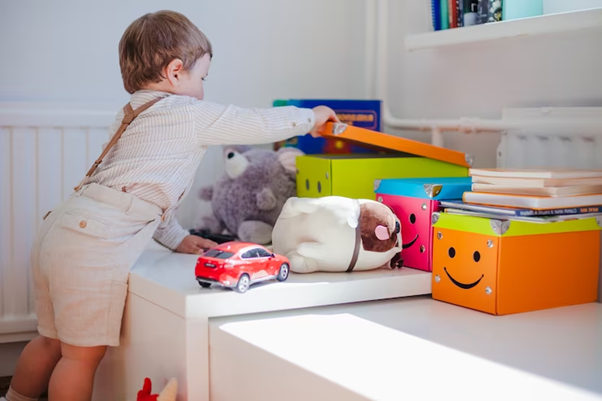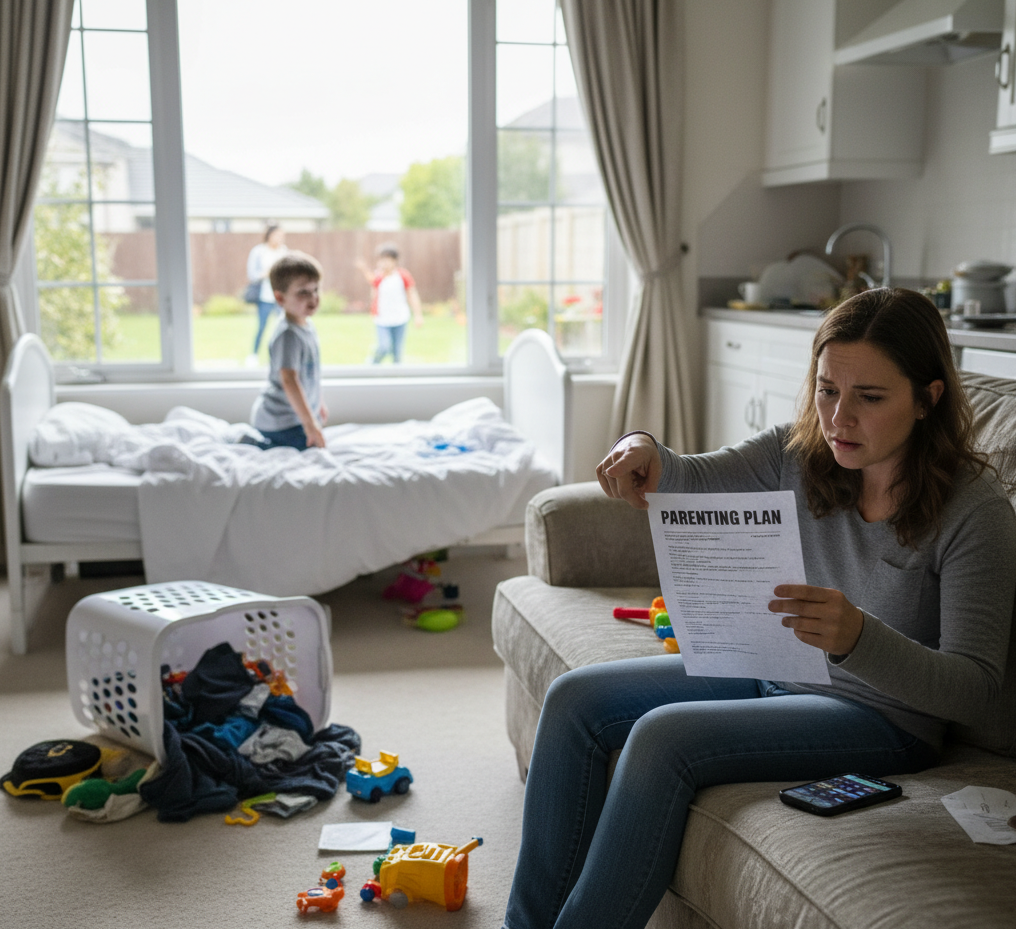Managing one shared co-parenting schedule when both of you have totally different parenting styles can feel exhausting. I know you try to keep everything running smoothly: school drop-offs, healthy meals, homework, bedtime… and then your child returns from the other home and suddenly everything goes off track.
At your place, bedtime is 8:30.
At theirs, it’s “whenever.”
You say no screens after dinner.
They say, just one more episode.
And you’re left wondering, “How am I supposed to keep this schedule together?”
But I want to tell you that – you and your co-parent do not need to run identical homes for your child to feel stable. Your child doesn’t need perfect matching rules. They need safety, predictability, and low conflict.
Let me explain how you can manage different parenting styles while still maintaining one solid, stable co-parenting schedule.
Step 1: Make Your Home the “Anchor” of Peace and Predictability
When both homes feel different, your home becomes the anchor your child can rely on. You don’t need to match the other house. You just need to make your house steady and calm.
That means keeping routines predictable, staying consistent with bedtime, meal times, and rules, and not talking negatively about the other parent. When your child compares the two homes, which is something every child does, try to respond with warmth instead of frustration.
For example, if they say:
“Mom lets me stay up late.”
Try responding gently:
“That sounds fun. At our home, we go to bed at 8:30 so you feel rested for school. Every home has its own routine.”
That one simple line keeps the peace, protects your schedule, and helps your child feel safe.
Step 2: Create a Flexible but Structured Schedule
When you and your co-parent bring two different parenting styles into one shared calendar, you need some structure to keep things from feeling chaotic. Not strict control. Just a clear, gentle plan. And let me tell you something I always recommend to the parents I work with.
You should create a simple weekly outline instead of a rigid hour-by-hour schedule. Also, focus on the important anchors like school time, homework, sports, meals, and bedtime. Then leave a little room for your co-parent’s natural style. This keeps the schedule steady without creating pressure on either side.
I also encourage you to use shared tools like Google Calendar or the 2houses app. These tools prevent misunderstandings and make communication much easier.
And you don’t need to be worried if your child seems a little off when they switch homes. That is something I call transition turbulence. Maybe they resist your rules or feel out of rhythm for a day or two. It is normal. Stay calm and stay consistent. Your child will find their way back into your routine very quickly.
Step 3: Communicate Like Teammates (Even If You Don’t Feel Like One)
You and your co-parent don’t need to be close or even get along perfectly to communicate well. I want you to think of this the same way I tell every parent I work with. Treat it like a simple partnership. Both of you are working toward the same goal, and that goal is your child’s emotional well-being.
Try to keep your messages calm and respectful. One approach I often recommend is the BIFF method. It stands for Brief, Informative, Friendly, and Firm. It helps you keep conversations short, clear, and completely drama free.
Let me give you an example.
Instead of saying something like,
“You never tell me anything about schedule changes!”
You can try:
“Hey, please update me about any schedule changes at least 24 hours earlier. It really helps keep things smooth for our child.”
I’m sure you’re seeing the difference here. Same message, but without the fight.
And if you notice that every discussion turns into an argument, then shift all communication to 2houses co-parenting app. This app will keep everything documented and help both of you stay calm and civil.
Step 4: Know Your Non-Negotiables and Let Go of the Rest
A lot of co-parenting stress comes from trying to control every detail. Trust me, that only brings more frustration. Focus on what really matters.
Your non-negotiables should be the things related to safety, health, and school.
Your preferences — like exact bedtime, screen limits, or chore routines — can be flexible.
And don’t forget: your co-parent has strengths too. Maybe they’re better at mornings, sports routines, or creative play. Let them own those areas. It reduces tension and helps your child feel the benefits of both worlds.
Step 5: Prepare Your Child for “Two Homes, Two Styles”
Your child doesn’t need identical environments. What they need is emotional permission to accept both homes without guilt.
Talk openly with them about differences.
Avoid comparing or criticizing the other household.
Teach them that different rules don’t mean confusion, they mean adaptability.
Kids who learn to navigate two sets of expectations grow into flexible, emotionally intelligent adults.
Step 6: Keep Adult Conflict Away From the Schedule
Your child should never feel responsible for the tension between parents. Don’t vent to them. Don’t make them choose. Don’t turn them into a messenger or a mediator.
Your job is to protect the schedule from adult conflict.
If the co-parenting situation ever involves serious concerns (substance issues, neglect, unsafe behavior), reach out for professional guidance, not your child.
Step 7: Accept the “B-Minus” Approach
In co-parenting, perfection is not the goal, peace is.
A “good enough” agreement is often more effective than trying to force perfection. If bedtime sometimes shifts between homes or if one home allows more screen time, that’s not the end of the world.
As long as your child is safe, supported, and emotionally secure, you’re doing everything right.
Save your energy for the things that truly matter:
• health
• school
• safety
• emotional stability
These are the pillars that shape them. Everything else is something you can gently let go of, and I promise you, letting go will bring you a lot more peace.
Finally, Stay Calm in the Chaos
You can’t control your co-parent. You can’t rewrite their routines. But you can control your own home, your reactions, and your peace.
Every time you choose calm instead of conflict…
Every time you stay consistent instead of criticizing…
Every time you put your child’s comfort above your frustration…
you make the shared schedule work, no matter how different both homes are.
Your child will not grow up remembering what exact time bedtime was. They will remember how loved, safe, and understood they felt in your home.
And that, my friend, is real co-parenting success.










